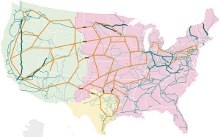To Grid or Not to Grid, That is the Question
By Dana Blankenhorn | January 20, 2011

As I have mentioned before, I believe it's a mistake for us to focus our view of solar energy solely on the grid.
There are two reasons for this. (The illustration is a thumbnail from NPR's great report on visualizing the U.S. power grid.)
First, it helps renewable opponents like the FUDmasters at the American Enterprise Institute dismiss us. See, no problem – we're not powering the grid with petroleum. (No, we're powering more than half of it with coal, which makes oil look clean.) We also wind up getting into arguments with the present – solar doesn't yet scale to utility quantities, something a nuclear plant does out of the box.
Second, and more important, focusing on the grid means we miss much of the real excitement in this space. China, for instance, has yet to connect half its wind power to the grid. They use it locally.
In some ways, what solar does is help make the grid obsolete, at least in the way we've thought of it – as the be-all and end-all of an electric-powered lifestyle.
Two things are happening at once.
Many of our appliances, starting with that PC in front of you, are becoming a lot more efficient, and they're gaining the intelligence needed to make the most of your home grid. A flat panel TV uses less power than your old model. An LED or fluorescent light bulb uses a lot less power than incandescent, and lasts longer. Other appliances are also becoming more juice-savvy.
At the same time, we're producing a lot more off-the-grid energy. Our marines in Afghanistan are learning to live off the Sun, maintaining their technology advantage while reducing the need for re-supply.
Meanwhile, ordinary Americans are starting to learn to live off the grid. Right now, it's gadget freaks and highly-knowledgeable tinkerers on the frontiers of America who are doing this, combining solar panels with generators. But this is the way it worked in the 1970s. What began with hobbyists moved in time to the mainstream, as companies learned to “productize” things.
Local governments here are beginning to ask, why are traffic signals locked to a grid that can go down with a single wire? Why aren't they generating their own power locally, and using wireless technology to coordinate with other lights? And where the grid is less powerful, in places like India, people are starting to ask the same questions about cell phone towers.
I don't think the grid is going away. But its function is becoming less that of a pipeline and more that of a phone network every day. It's there to move things around, to balance supply and demand intelligently, to back things up.
In 10 years, for many of us, it will no longer be the be-all and end-all of our home power needs. And the result will be a far more flexible society, one where a downed power line won't mean a blackout, just a minor inconvenience the system will route around and most of us will barely notice.
Comment:
The problem with "not connecting to the grid" is it limits storage capacity of wind/solar power. Excess wind and solar power can be used to pump water back into hydro dams, store energy as compressed air or in batteries for future use when the wind doesn't blow but demand is high. It also enables power from such renewables to be transmitted to areas where demand is high This is the crucial missing peices of renewables where storage and grid capacity enable power to be used at a later time or in another area and it is here that our research needs to be focused.
 To subscribe or visit go to:
http://www.renewableenergyaccess.com
To subscribe or visit go to:
http://www.renewableenergyaccess.com